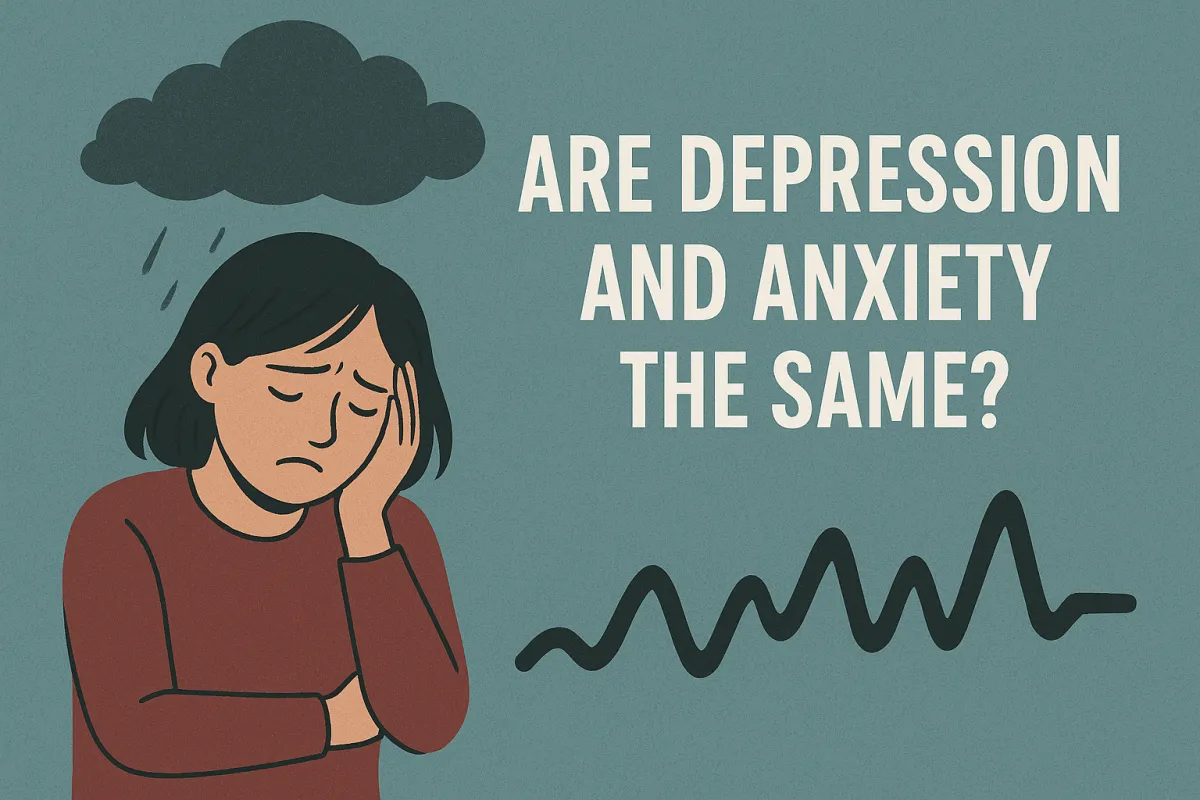
Are Depression and Anxiety the Same?
Are Depression and Anxiety the Same? Unraveling the Key Differences
No, depression and anxiety are not the same. They are distinct mental health disorders with unique symptoms. However, they are closely related and very frequently occur together. Understanding the difference is crucial for getting an accurate diagnosis and effective treatment.
Think of it this way: if depression is like being in a deep, dark hole with no energy to climb out, anxiety is like being trapped in a room where the walls are constantly closing in. They feel different, but it's possible to feel both at the same time.
At a Glance: Depression vs. Anxiety
Primary focus:
Depression: Past-oriented feelings of loss, sadness, and hopelessness.
Anxiety: Future-oriented feelings of worry, fear, and dread.
Key Emotional Symptom:
Depression: Pervasive sadness, emptiness, and loss of interest (anhedonia).
Anxiety: Excessive fear, nervousness, and a constant sense of impending doom.
Key Physical Symptoms:
Depression: Low energy, fatigue, sleep changes (too much or too little), moving slowly.
Anxiety: Muscle tension, restlessness, panic attacks, rapid heartbeat, feeling "on edge."
Core Thought Pattern:
Depression: "What's the point?" Hopelessness, worthlessness, guilt.
Anxiety: "What if something bad happens?" Catastrophic thinking, overestimation of danger.
Diving Deeper into the Differences
What Does Depression Feel Like?
Depression (Major Depressive Disorder) is primarily characterized by a persistently low or sad mood and a loss of interest or pleasure in activities once enjoyed (this is called anhedonia). It's more than just feeling "blue"; it's a heavy state that affects every aspect of life.
Key Symptoms of Depression:
Emotional: Deep sadness, feelings of emptiness, hopelessness, irritability, and intense guilt or worthlessness.
Physical: Significant changes in appetite or weight, sleep disturbances (insomnia or oversleeping), constant fatigue, and low energy.
Cognitive: Difficulty concentrating, remembering details, and making decisions. Persistent thoughts of death or suicide.
A person with depression often feels drained and may struggle to get out of bed, as their motivation and energy are severely depleted.
What Does Anxiety Feel Like?
Anxiety disorders (like Generalized Anxiety Disorder, Panic Disorder) are characterized by excessive, uncontrollable worry about future events. It's the body's "fight or flight" system stuck in the "on" position, even when there is no immediate threat.
Key Symptoms of Anxiety:
Emotional: Feelings of dread, panic, or "losing control." Constant nervousness and tension.
Physical: Restlessness, muscle tension, rapid heart rate, shortness of breath, sweating, trembling, and gastrointestinal issues.
Cognitive: Racing thoughts, difficulty concentrating, and a mind that constantly anticipates the worst-case scenario.
A person with anxiety often feels "wired but tired"—exhausted yet unable to quiet their mind or body.
The Critical Link: Why They Often Occur Together
While distinct, depression and anxiety are frequent companions. It's estimated that nearly 60% of people with depression also have symptoms of an anxiety disorder.
There are several reasons for this high rate of co-occurrence:
Shared Biological Vulnerabilities: Both conditions involve similar brain circuits and neurotransmitters, like serotonin and norepinephrine.
Genetic Factors: A genetic predisposition can make someone susceptible to both depression and anxiety.
Psychological Overlap: The relentless worry and avoidance caused by anxiety can lead to isolation and hopelessness, which are hallmarks of depression. Conversely, the low energy and despair of depression can make someone feel unable to cope with life's demands, leading to intense anxiety.
Getting the Right Diagnosis and Treatment
Because the conditions can look similar and overlap, a proper diagnosis from a mental health professional is essential. They will ask detailed questions to determine if you have:
Depression only
An Anxiety Disorder only
Comorbid Depression and Anxiety (meaning both are present)
The good news is that many effective treatments work for both conditions:
Therapy: Cognitive Behavioral Therapy (CBT) is highly effective for both, teaching skills to challenge negative thought patterns.
Medication: Certain antidepressants (like SSRIs or SNRIs) can help alleviate symptoms of both depression and anxiety.
Lifestyle Changes: Regular exercise, mindfulness, and stress-management techniques can significantly improve symptoms for both conditions.
Conclusion: Different, But Often Connected
So, are depression and anxiety the same? No, they are different disorders. Depression is often rooted in feelings of past loss and hopelessness, while anxiety is fueled by future-oriented fear and worry.
However, if you are experiencing symptoms of one, it is very common to experience symptoms of the other. Recognizing the differences is the first step toward getting a clear diagnosis and a treatment plan that addresses your specific needs, helping you find a path toward feeling better.
If you recognize your own experience in these descriptions, know that you are not alone, and help is available. Reach out to a doctor or a mental health professional for an evaluation. For immediate support, you can connect with a trained counselor 24/7 by calling or texting 988 (in the US and Canada).
Book Your FREE 45-60 Minute Mental Health Life Coaching Session Now!
